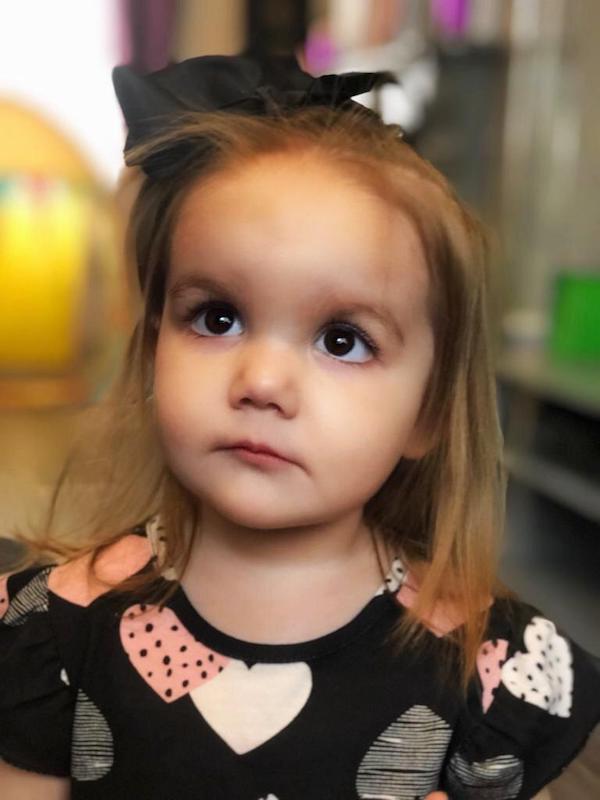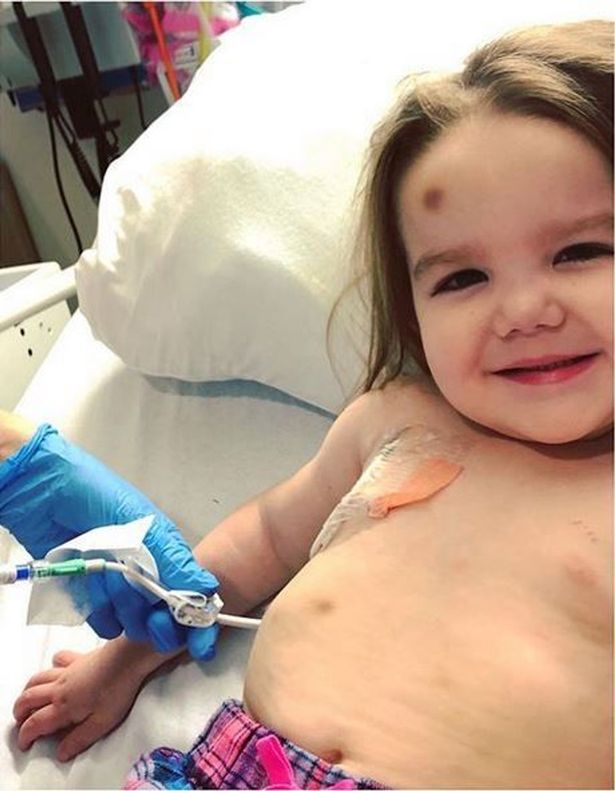Every 20 minutes someone in the UK is diagnosed with blood cancer and the register of stem cell donors – who are needed to save thousands of patients’ lives – does not currently meet the demand.
Only 1 in 3 patients will find a matching donor within their family, which means 2 in 3 have to rely on a generous stranger registering with a charity like DKMS, just like Josie.
Josie was diagnosed in late 2021 following the diagnosis of her older sister, Adeline.
It was an incredibly upsetting blow for their parents.
Both sisters suffer from a variety of symptoms, including weakness, failure to thrive and overall developmental delays.
Josie also struggles with bone abnormalities, eyesight and gut issues.
Josie’s situation is so rare, it is difficult for doctors to decide the next treatment steps, but as Josie is so young the best shot at curing her condition is a blood stem cell transplant from a perfect 10/10 match.
Unfortunately, none of her immediate family is compatible and so Josie and her family have to turn to the international stem cell register, for the best chance of her having a normal life.
No match has been found yet so her family are making an urgent appeal for all people eligible to register with DKMS.

Josie Davidson (3) from Alness was first diagnosed in 2021 following the diagnosis of her older sister, Adeline (6).
Differences in Josie’s overall development became visible as she was much slower in meeting milestones than her fraternal twin brother, Jude.
Josie’s mum, Steph, noticed these symptoms in Josie were similar to those Adeline had.
So, when Adeline was diagnosed, Steph pushed for the whole family to also be tested.
Her suspicions were true when Josie was found to have the gene DNAJC21, which is a genetic mutation that causes bone marrow failure, and if left, can cause leukaemia, including acute myeloid leukaemia.
For Josie’s situation, doctors do not want to risk giving her a blood stem cell transfusion unless it is a 100% match.
As her condition is so rare, doctors are continuing to monitor her and ensure her levels stay stable till a 10/10 match is found or her condition gets worse She continues to stay on medication to help with her symptoms and immune deficiencies.
Her mum, Stephanie, says:
“It is so easy to sign up to the register, it’s not painful at all, just a simple swab.
“Who wouldn’t want to save someone’s life?
“These illnesses are rare, but they are still out there and need people’s help.
“There’s so many families out there that can benefit from support in the form of blood donations.”
At the moment Josie attends nursery when she is not travelling the 4 hours to Glasgow for her doctor’s appointments that occur on a weekly basis.
Her tests include MRI scans, X-rays and ultrasounds to ensure her bones, blood flow and overall mobility of joints is stable.
Despite her hectic young life, Josie is a happy young girl who enjoys participating in activities such as playing hide and seek or painting and loves meeting new people.
For many young children like Josie, who cannot find a match within their family, they rely on the stem cell register of kind strangers willing to donate in order to save their life and give them a happy health future.
Stem cell donation
There is a lot of fear around blood stem cell donation – of the process itself and of having a ‘depleted’ supply of stem cells – but this just isn’t the case.
The process is incredibly easy to do and is similar to donating blood.
Around 90% of all donations are made through a method called peripheral blood stem cell (PBSC).
In this method, blood is taken from one of the donor’s arms and a machine extracts the blood stem cells from it.
The donor’s blood is then returned to them through their other arm.
This is an outpatient procedure that is usually completed in 4-6 hours.
In just 10% of cases, donations are made through bone marrow collection.
This is under general anaesthetic so that no pain is experienced.
If you’re 17 – 55 (and in general good health) take the first step go to DKMS to register as a potential stem donor and visit dkms.org.uk today.



